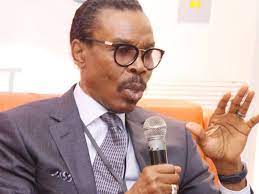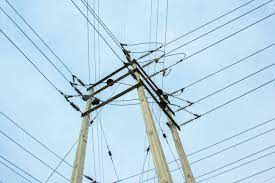
By Habibat Aliu
An economist, Bismarck Rewane has said that the need to strengthen the nation’s institutions and accelerate the implementation of developmental programmes to enable the country to record meaningful growth this year.
Rewane, while addressing participants at the Nigerian-British Chamber of Commerce (NBCC) 2023 Macroeconomic Outlook held in Lagos, said that weak institutions pose a significant drag on the nation’s economic growth, noting that building stronger institutions in Nigeria would help mitigate uncertainties supported by appropriate policy choices that would engender rapid development across sectors.
He also stated that the government’s ability to deploy funds approved for developmental projects for the purpose intended is critical to economic growth.
Rewane, who is also the Managing Director/Chief Executive Officer of Financial Derivatives Company, projected that the Nigerian economy would experience a slower growth rate of 2.7 per cent in 2023.
He pointed out that a slide into recession was unlikely for the country.
According to him, the expected slow growth rate will take its toll on businesses and investors this year, particularly with the election anxiety.
Asides from the slow growth rate, he also listed key challenges for the country in 2023 including rising sovereign debt, elevated interest rates, persisting exchange rate premiums and worsening fiscal deficit.
Furthermore, he said Nigeria’s inflation was expected to moderate; still above the 9-13 per cent threshold while its Gross Domestic Product (GDP) performance for 2023 would hover around 3.03 per cent in the first quarter.
He pointed out that the country’s economy in the global context was more vulnerable in 2022 due to the numerous macro economic issues bedeviling the country since 2003.
Rewane listed some of the persisting structural challenges including low-value agricultural export commodities; problems of export diversification, and worsening terms of trade.
Others include high-income inequality, low market competitiveness and price distortion, and weak economic and political institutions among others.
However, he noted that while global economic headwinds such as the ongoing Russia-Ukraine war, COVID-19 crisis, supply chain distortions, and others persisted, several sectors of the Nigerian economy held promise.
“Key sectors to drive GDP growth in 2023 include financial services, Information, and Communication Technology (ICT), trade, manufacturing, agriculture, and real estate/construction. The inflation trajectory in 2023 would average 16.27 per cent.
“For the exchange rate, more aggressive measures will be taken to keep the Naira stable in 2023 and a unitary/ floating exchange rate system is likely to be adopted in the latter part of the year. Also, the country’s Gross external reserve is expected to rise to 41 billion dollars on the expected increase and sustained levels of oil output.
“As projected, one-third of the global economy will plunge into recession, which is unlikely for the Nigerian economy, but an economic slowdown is unavoidable,” he said.
Vice President of the Chamber, Seyi Adeyemi said developed countries have succeeded in building institutions that are not subject to the whims and caprices of individuals but governed by basic rules, regulations, ethics, and guidelines.
“There is a need to build institutions around policies and once this is done, the country can stick to these policies and be able to prevent abuses and ensure continuity.
” The most important thing is the ‘Political Will’ of the leadership to sustain those institutions so that they do not become instruments in the hands of the leaders to ensure that they get the independence they require to operate.”
President, of NBCC, Ms. Bisi Adeyemi, said the yearly event is expected to provide a comprehensive assessment and insight into the opportunities, challenges, and indeed, the threats that businesses should expect to contend with within the year, both locally and globally as well as conversation on policy issues that would help shapen businesses







